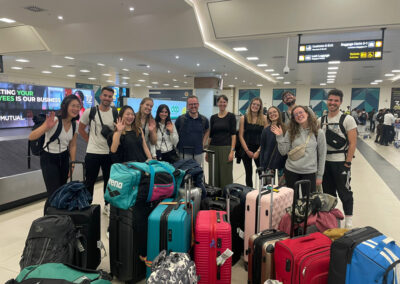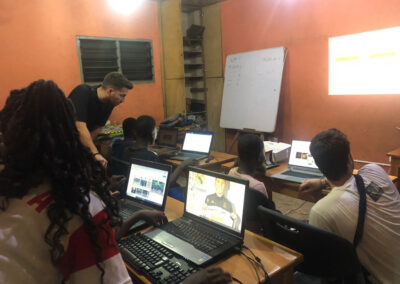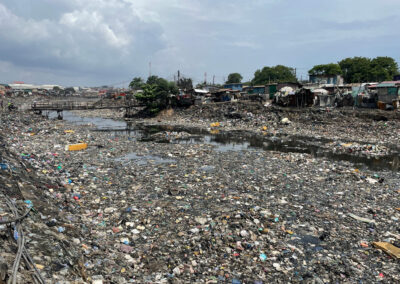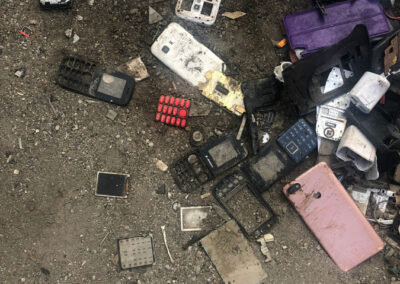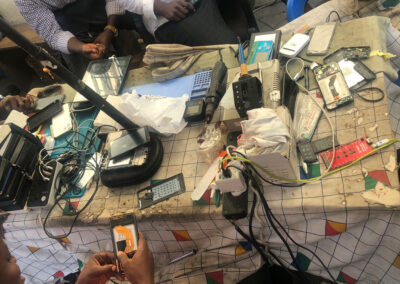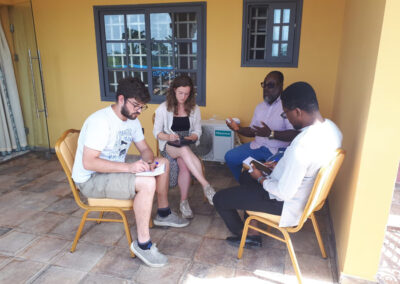Students from TUM Campus Straubing (TUMCS) travel to Ghana to conduct research on sustainable e-waste management
TUMCS CEC | 2023-12-21
As part of the seminar “Circular Economy and Sustainability Management in the Global South”, ten TUMCS students, accompanied by Prof. Dr. Magnus Fröhling and Vanessa Heinrich, traveled to the Ghanaian capital Accra. For years, e-waste from all over the world – including Germany – has accumulated in West Africa, mostly imported illegally into the region and processed and recycled locally under precarious and dangerous conditions.
One center is Old Fadama, the largest inner-city slum in Accra, which is also considered the largest dumping ground for used electrical appliances and scrap metal in West Africa. The idea of the excursion was for the students not to research the problem of e-waste in Ghana solely based on literature in the Global North. Instead, in addition to literature studies, they were to be given the opportunity to get an idea of the situation on the ground. Innovative ideas and concepts for circular e-waste management were to be developed primarily through discussions with local stakeholders and valuable knowledge for the respective research work was to be gathered through the exchange. Based on the knowledge generated in this way, the students could adapt their research plans to the local situation.
The students visited various institutions and individuals, gained unique insights into the informal e-waste ecosystem and were able to discuss potential starting points for closing resource cycles. On the one hand, they held discussions with people in the e-waste sector in Old Fadama and at markets for used electronic products. They also visited institutions such as the Centre for Climate Change and Sustainability Studies at the University of Ghana, the Mountain Research Institute (MRI) and the Gesellschaft für Internationale Zusammenarbeit (GIZ), and held talks with the business incubator Kumasi Hive.
The students were deeply impressed and moved by the circumstances under which e-waste is recycled, the livelihoods of those involved and their families, and the will of many young people and researchers to make a difference.
This impression was also reinforced during the cultural and charitable exchange, which was integral to the excursion alongside the research work. The focus here was on the charitable institution Holy Bakhita, which runs a kindergarten and an evening school for young adults in Old Fadama and has been firmly anchored in the local community for years. Before the trip, the students were involved in a fundraising campaign to collect both donations in kind and money for Holy Bakhita. Thanks to this, it was not only possible to finance scholarships for children and young people but also to further expand the facility itself. In addition, the students also gave lessons at the evening school. In Accra, there was also the opportunity to explore the traditional Jamestown district together with locals. On an excursion to Cape Coast in the west, the participants expanded their knowledge of the dark chapter in the history of slavery on the coast of West Africa.
On their return, the students are now in the process of processing their experiences and research findings and integrating them into their seminar papers.
Die-Abendschule-von-Holy-Bakhita
The evening school of Holy Bakhita for children and young adults. Photo: CEC/TUM.
Eindruecke-aus-Old-Fadama
Impressions from Old Fadama, the largest inner-city slum in Accra. Photo: CEC/TUM.

